sicily
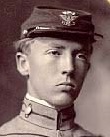
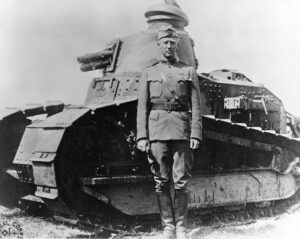 There are men of war, and then there are men of war. United States General George S Patton was the latter…meaning that he almost lived for war. Patton was a man who came from a long line of military people, and while he wasn’t always a tactful man, he was a great warrior…a fact that he proved over and over again. Many people didn’t like him much, but they couldn’t deny his capabilities. Patton was a great leader, but he wasn’t really a people person, and that got him in some trouble.
There are men of war, and then there are men of war. United States General George S Patton was the latter…meaning that he almost lived for war. Patton was a man who came from a long line of military people, and while he wasn’t always a tactful man, he was a great warrior…a fact that he proved over and over again. Many people didn’t like him much, but they couldn’t deny his capabilities. Patton was a great leader, but he wasn’t really a people person, and that got him in some trouble.
George Smith Patton Jr, who was born to George Smith Patton Sr and his wife, Ruth Wilson, the daughter of Benjamin Davis Wilson on November 11, 1885, in San Gabriel, California. Maybe because of his family history, or maybe it was just him, but Patton never seriously considered a career other than the military. At the age of seventeen he tried for an appointment to the United States Military Academy at West Point, New York. He also applied to several universities with Reserve Officer’s Training Corps programs, and was accepted to Princeton College, but eventually decided on Virginia Military Institute (VMI), which his father and grandfather had attended. Later, after studying at West Point, he served as a tank officer in World War I. Patton loved the tank, and his time as a tank officer, as well as his military strategy studies led him to become an advocate of the crucial importance of the tank in future warfare. When the United States entered World War II, Patton became the logical choice for the command of an important US tank division, and his division played a key role in the Allied invasion of French North Africa in 1942. Then, in 1943, in the Allied assault on Sicily, Patton and the US 7th Army in its assault on Sicily and won fame for out-commanding Montgomery during their pincer movement against Messina. Patton loved competition, and this was his chance to shine. On August 17, 1943, Patton and his 7th Army arrived in Messina several hours before British Field Marshal Bernard L Montgomery and his 8th Army, winning the unofficial “Race to Messina” and completing the Allied conquest of Sicily.
Although Patton was one of the most capable American commanders in World War II, he was also one of the most controversial. Patton was a “pull yourself up by your bootstraps” kind of guy, and therefore had no personal understanding of fear or fatigue. PTSD, battle fatigue, or shell shock were conditions he could not accept in anyone. In fact, they infuriated him so much that he actually slapped two soldiers who were suffering with the conditions. During the Sicilian campaign, Patton generated considerable controversy when he accused a hospitalized US soldier suffering from battle fatigue of cowardice and then personally struck him across the face. The famously profane general was forced to issue a public apology and was reprimanded by General Dwight Eisenhower. They would have liked to “walk away” from Patton, but when it came time for the invasion of Western Europe, Eisenhower couldn’t find a general as formidable as Patton, so, once again Patton was granted an important military post. In 1944, Patton commanded the US 3rd Army in the invasion of France. Then, in 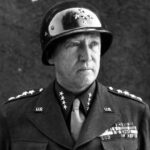
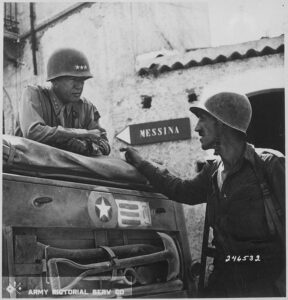 December of that year Patton’s great expertise in military movement and tank warfare helped to crush the German counteroffensive in the Ardennes.
December of that year Patton’s great expertise in military movement and tank warfare helped to crush the German counteroffensive in the Ardennes.
During one of his many successful campaigns, General Patton was said to have declared, “Compared to war, all other forms of human endeavor shrink to insignificance.” Patton died in a hospital in Germany on December 21, 1945, from injuries sustained in an automobile accident near Mannheim. He was just 60 years old.
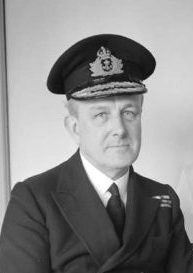 There was, during the Second World War, a somewhat strange and almost morbid plan that was concocted to dupe the Germans into believing that the Allies were going to invade Greece in 1943, when in fact, they were going to invade Sicily, some 500 miles away. The success of the mission really depended on the element of surprise, and in the end, the Allies needed something that would be believable to the Germans.
There was, during the Second World War, a somewhat strange and almost morbid plan that was concocted to dupe the Germans into believing that the Allies were going to invade Greece in 1943, when in fact, they were going to invade Sicily, some 500 miles away. The success of the mission really depended on the element of surprise, and in the end, the Allies needed something that would be believable to the Germans.
The thing that made the operation morbid was that in the end, they would use a dead body to bring about their deception. In their plan a body was dumped in the sea, to be discovered by Axis forces, carrying fake secret documents suggesting the invasion would be staged in Greece. They were a bit shocked when their plan worked, but work it did. The German troops were diverted to Greece, and Operation Mincemeat became a huge success, but even after it was over, it remained a source of secrecy, confusion, and conspiracy theory. The biggest source of confusion being…just who was this man who was found floating in the ocean, and how did he really die? For most people, the operation remains a mystery to this day, but one man believes that he now knows the true identity of the man found floating in the ocean.
In the 1956 film called “The Man Who Never Was,” one historian claims to have finally established beyond any reasonable doubt the identity of the person who played the part of the dead man, He believes he was a homeless Welshman named Glyndwr Michael. The body, which was given the identity of a fake Royal Marine, Major William Martin, was dropped into the sea off Spain in 1943. Winston Churchill had remarked that “Anyone but a bloody fool would know it was Sicily”, but after the tides carried Major Martin’s body into the clutches of Nazi agents, Hitler and his High Command became convinced Greece was the target. “You can forget about Sicily. We know it’s in Greece,” proclaimed General Alfred Jodl, head of the German supreme command operations staff.
“Mincemeat swallowed, rod, line and sinker” was the message sent to Churchill after the Allies learned the plot had worked. In recent years, there have been repeated claims that Mincemeat’s chief planner, Lieutenant Commander Ewen Montagu, was so intent on deceiving the Germans that he stole the body of a crew member from HMS Dasher, a Royal Navy aircraft carrier which exploded off the Scottish coast in March 1943, and lied to the dead man’s relatives. In 2003, a documentary based on 14 years of research by former police officer Colin 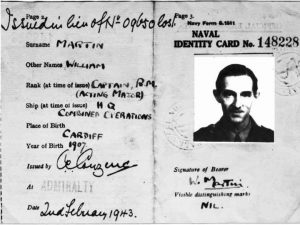 Gibbon claimed that ‘Major Martin’ was Dasher sailor Tom Martin. Then in 2004, official sanction appeared to be given to another candidate, Tom Martin’s crewmate John Melville. At a memorial service on board the current HMS Dasher, a Royal Navy patrol vessel, off the coast of Cyprus, Lieutenant Commander Mark Hill named Mr Melville as Major Martin, describing him as “a man who most certainly was”. Mr Melville’s daughter, Isobel Mackay, later told The Scotsman newspaper: “I feel very honored if my father saved 30,000 Allied lives.” I don’t suppose that we will ever know who the man really was, without exhuming his body, and that hardly seems right. Whoever he was, his family can rest assured that he saved many lives that day.
Gibbon claimed that ‘Major Martin’ was Dasher sailor Tom Martin. Then in 2004, official sanction appeared to be given to another candidate, Tom Martin’s crewmate John Melville. At a memorial service on board the current HMS Dasher, a Royal Navy patrol vessel, off the coast of Cyprus, Lieutenant Commander Mark Hill named Mr Melville as Major Martin, describing him as “a man who most certainly was”. Mr Melville’s daughter, Isobel Mackay, later told The Scotsman newspaper: “I feel very honored if my father saved 30,000 Allied lives.” I don’t suppose that we will ever know who the man really was, without exhuming his body, and that hardly seems right. Whoever he was, his family can rest assured that he saved many lives that day.
 Earthquakes can happen anywhere, but there are areas that are more prone to earthquakes than other areas. When we think about that, we think of Alaska, California, or Japan, all of which experience daily earthquakes. Of course, there are many other places that get a lot of earthquakes. One such place is in Italy. The area around Sicily and Calabria are known as la terra ballerina, “the dancing land,” for the periodic seismic activity that strikes the region. I would have thought that with 12,000 earthquakes a year in Alaska, or 10,000 earthquakes a year in California, or 1,500 earthquakes in Japan, that any of these places would be called “the dancing land” before the area of Sicily and Calabria, which doesn’t have nearly as many.
Earthquakes can happen anywhere, but there are areas that are more prone to earthquakes than other areas. When we think about that, we think of Alaska, California, or Japan, all of which experience daily earthquakes. Of course, there are many other places that get a lot of earthquakes. One such place is in Italy. The area around Sicily and Calabria are known as la terra ballerina, “the dancing land,” for the periodic seismic activity that strikes the region. I would have thought that with 12,000 earthquakes a year in Alaska, or 10,000 earthquakes a year in California, or 1,500 earthquakes in Japan, that any of these places would be called “the dancing land” before the area of Sicily and Calabria, which doesn’t have nearly as many.
Nevertheless, the name was given and it stuck. While it may not have as many, the ones that hit there seem to be especially devastating. In 1693, 60,000 people were killed in southern Sicily by an earthquake, and in 1783 most of the Tyrrenian coast of Calabria was leveled by a massive earthquake that 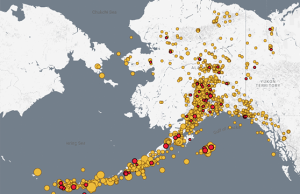 killed 50,000. The quake of 1908 was particularly costly in terms of human life because it struck at at dawn, catching most people at home in bed rather than in the relative safety of the streets or fields. The December 28, 1908 earthquake which struck at 5:20am was the most destructive earthquake in recorded European history strikes the Straits of Messina in southern Italy. The cities of Messina in Sicily and Reggio di Calabria on the Italian mainland were leveled by the devastating quake. The earthquake and tsunami it caused killed an estimated 100,000 people. The main shock registered an estimated 7.5 magnitude on the Richter scale. It caused a devastating tsunami with 40-foot waves that washed over coastal towns and cities. The two major cities on either side of the Messina Straits–Messina and Reggio di Calabria, had about 90 percent of their buildings destroyed. The quake cut telegraph lines and damaged railway lines, seriously slowing down the relief efforts. To make matters worse, many of the remaining buildings were destroyed by hundreds of smaller
killed 50,000. The quake of 1908 was particularly costly in terms of human life because it struck at at dawn, catching most people at home in bed rather than in the relative safety of the streets or fields. The December 28, 1908 earthquake which struck at 5:20am was the most destructive earthquake in recorded European history strikes the Straits of Messina in southern Italy. The cities of Messina in Sicily and Reggio di Calabria on the Italian mainland were leveled by the devastating quake. The earthquake and tsunami it caused killed an estimated 100,000 people. The main shock registered an estimated 7.5 magnitude on the Richter scale. It caused a devastating tsunami with 40-foot waves that washed over coastal towns and cities. The two major cities on either side of the Messina Straits–Messina and Reggio di Calabria, had about 90 percent of their buildings destroyed. The quake cut telegraph lines and damaged railway lines, seriously slowing down the relief efforts. To make matters worse, many of the remaining buildings were destroyed by hundreds of smaller 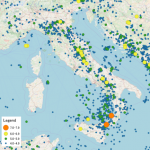 tremors over subsequent days. These tremors injured or killed rescuers. On December 30, King Victor Emmanuel III arrived aboard the battleship Napoli to inspect the devastation.
tremors over subsequent days. These tremors injured or killed rescuers. On December 30, King Victor Emmanuel III arrived aboard the battleship Napoli to inspect the devastation.
To make matters worse, a steady rain fell on the ruined cities, forcing the dazed and injured survivors, clad only in their nightclothes, to take shelter in caves, grottoes, and impromptu shacks built out of materials salvaged from the collapsed buildings. Veteran sailors could barely recognize the shoreline because long stretches of the coast had sunk several feet into the Messina Strait. The devastation was horrific. After all that, I can see why it is called la terra ballerina, “the dancing land.”
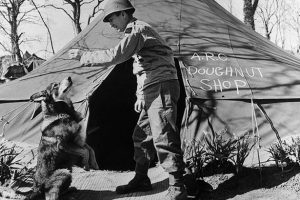
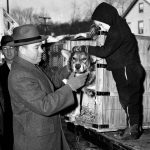 During the United States led invasion of Sicily in July 1943, called Operation Husky, US Army dog, Chips and his platoon came under fire as they landed on a beach at dawn. Obviously, dogs made great sentries for the Army, and so were incorporated into the Army for that purpose. Chips was very good at his job and very loyal to his military masters. Fear never figured into Chips actions. If he saw that his platoon was under attack, Chips sprang into action. Chips charged an enemy machine gun to protect his people. His quick action was credited with saving his platoon. When the attack began, the soldiers scrambled to find cover, but Chips broke free from his lead and ran directly to the hut that housed the machine gun. Chips entered the hut, and immediately the shooting stopped. There was no barking or snarling, and no screaming, but momentarily, an enemy soldier appeared with Chips at his throat. Of course, that explained the silence. Neither the enemy soldier or Chips were able to speak or make any noise at that point, because they were otherwise occupied. I can only imagine the thoughts that were going through the enemy soldier’s mind. I would think there would be a large degree of praying for his life. At that point, I suspect the US Army platoon looked like angels sent to free the poor enemy soldier, and a prisoner of war camp might have looked like a relaxing vacation, compared to having his throat ripped out but a viscous German Shepherd dog. The quick and capable action displayed by Chip allowed the platoon to push on with their mission.
During the United States led invasion of Sicily in July 1943, called Operation Husky, US Army dog, Chips and his platoon came under fire as they landed on a beach at dawn. Obviously, dogs made great sentries for the Army, and so were incorporated into the Army for that purpose. Chips was very good at his job and very loyal to his military masters. Fear never figured into Chips actions. If he saw that his platoon was under attack, Chips sprang into action. Chips charged an enemy machine gun to protect his people. His quick action was credited with saving his platoon. When the attack began, the soldiers scrambled to find cover, but Chips broke free from his lead and ran directly to the hut that housed the machine gun. Chips entered the hut, and immediately the shooting stopped. There was no barking or snarling, and no screaming, but momentarily, an enemy soldier appeared with Chips at his throat. Of course, that explained the silence. Neither the enemy soldier or Chips were able to speak or make any noise at that point, because they were otherwise occupied. I can only imagine the thoughts that were going through the enemy soldier’s mind. I would think there would be a large degree of praying for his life. At that point, I suspect the US Army platoon looked like angels sent to free the poor enemy soldier, and a prisoner of war camp might have looked like a relaxing vacation, compared to having his throat ripped out but a viscous German Shepherd dog. The quick and capable action displayed by Chip allowed the platoon to push on with their mission.
Of course, Chips was simply doing his job, and likely thought nothing more of it. He loved these men, and putting his life on the line for them was just what he would do for those he loved. The men he saved, felt very differently about their hero, however. It’s hard not to feel like the being that put itself between you and certain death is very special. At the time, nothing was done to recognize the heroic act of Chips, but the men never forgot what their fellow soldier had done for them. My guess is that Chips got a pat on the head, and maybe a 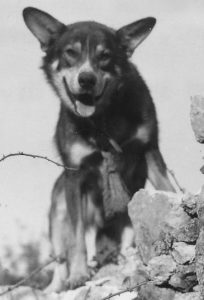
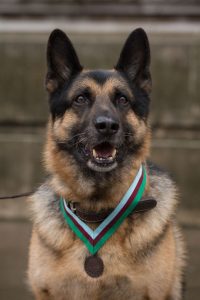 little extra food that night, but it was not enough for what he had done. How could it be?
little extra food that night, but it was not enough for what he had done. How could it be?
I guess the Army must have agreed, because Chips was posthumously awarded the PDSA Dickin Medal, which is recognized as the “Animal Victoria Cross,” 71 years after his passing, for protecting British troops. Chips was also a sentry at the Casablanca Conference in January 1943, where Churchill and Roosevelt met, so he had some experience in sentry duties before his famous act of protection. Chips continued on in his career until 1945. Then he was returned to his family in New York in 1945. Unfortunately, he died the next year…but Chips died a hero.

